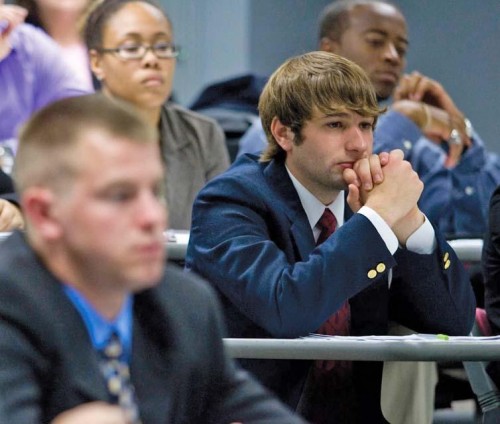
Cajun Farmers Market asset to Houma’s economy; city looking to expand to downtown
March 30, 2010April 4: Horseshow (Houma)
April 1, 2010A recent curriculum revision and the introduction of a new master’s program has led Nicholls State University to the front lines of today’s workforce. And although the transition is officially over, the journey has just begun. The Masters of Business Administration program at Nicholls was revamped about a year ago, an initiative spearheaded by Associate Dean of the College of Business Administration Chuck Viosca.
“It was a yearlong process,” he explained. “It didn’t just happen overnight.”
In order to serve the needs of a growing number of students – most of whom hold busy schedules – “…we devised the curriculum to be more practical and applied for those already in the workforce,” noted Viosca.
The courses – from marketing and management to information systems – now focus heavily on case studies and exercises, which allows students to rapidly acquire new skills and take them directly into the workforce.
“Our program reflects the current needs of business,” said Luke Cashen, director of the Executive Masters in Business Administration program at Nicholls. “The former materials, although appropriate, were not on the cutting edge of where they needed to be. Therefore, we modified the curriculum.”
With the updates in place, officials also said the program is less employer-specific, which allows for greater flexibility and leeway for graduates who are job hunting, or just looking to further their education.
Either way, the degree is a good one to have, employers contend.
“I believe the [MBA] does prepare individuals for the rigors of the business environment. And not just locally, but for them to take that knowledge, it can apply to international settings, or even if they just move to New York,” said Cashen.
“Our business degree is going to serve you well. Show me an organization that doesn’t operate like a business,” added Viosca. “Everybody needs an accountant.”
The spread of globalization and the advent of the Internet has made the degree even more important, as companies big and small are lining up overseas to try and harness untapped consumer potential. And in this era, the local market is no exception.
“A good bit of organizations that employ our students already are multinational corporations, especially in the marine industry, and oil and gas that have significant interests outside American land and American waters,” touted Cashen.
It’s those companies – like Bollinger and John Deere – that have an extended global reach and are looking to hire employees that can add significant value to the company.
While the traditional MBA program might be a winner, it’s not the only option for graduate students in the business arena.
By hybridizing the traditional program with online lessons, Nicholls created an Executive Masters in Business Administration program (EMBA), which allows working professionals to earn a degree without leaving work, or for the most part, home.
The EMBA takes 17 months to acquire, while class work is split between the Web and one in-class session every other Saturday. Courses run sequentially for seven-week periods, as every seven weeks a new course is taught. The program has 11 courses and a total of 33 credit hours.
Officials said demand for the new program is high due to its structure, especially among students who aren’t necessarily looking for a traditional classroom setting, but are seeking education delivered professionally.
While registration is generally limited to 15 students, administrators in the college’s business department are striving to create more slots and construct more classrooms to accommodate the growing interest.
Nicholls is currently renovating a classroom in the business college to host a new group of students, according to Cashen.
“In the process [of implementing the program], we’ve also been able to recruit individuals outside a particular geographic region, when we normally wouldn’t be able to do so,” he noted. “The EMBA has been very attractive.”
On average, students enrolled in the program carry around 13 years of professional working experience.
Companies are also able to benefit from the EMBA, which can allow employees to move the organization in multiple directions without hiring new hands – whether the firm’s aim is a domestic or international market.
Some students are even sponsored by their employers. “It’s very deliberate,” said Cashen. And after graduating, those students will be able to meet the company’s most direr needs: “Make us more money. Save us more money. Bring us to the next level in our organization. And that’s what we provide,” he explained.
As the program continues to expand and business becomes more and more integral to the fabric of everyday life, the College of Business at Nicholls will continue to stand tall.
“Business is one of those legacy brands of Nicholls State University. We’re not a fad,” claimed Cashen.
“The College of Business is part of the core of the university,” he explained. “As we face budget cuts, like all institutions are facing, in that possible [line] of cuts, we must preserve the core. And we are definitely part of that core.”
When May arrives, a large chunk of students will be gripping a business degree – both undergraduates and graduates.
No matter what the organization, remember it runs like a business.
“They sell services and those services cost money to provide,” said Cashen. “It’s a universal truth and fundamental truth that we cannot escape.”
Nicholls business students listen to visiting regional sales professionals speak to them about what they look for when hiring employees. The sales professionals visit the Nicholls department of Business every year for Bayou Sales Challenge. * Photo provided by NICHOLLS STATE UNIVERSITY













